- Home
- Kristin Harmel
The Forest of Vanishing Stars Page 2
The Forest of Vanishing Stars Read online
Page 2
But she had more to teach, so on their forays into towns, she began to steal books, too. She taught the child to read, to understand science, to work with numbers. She insisted that Yona know the Torah and the Talmud, but she also brought her the Christian Bible and even the Muslim Quran, for God was everywhere, and the search for him was endless. It had consumed Jerusza’s whole life, and it had brought her to that dark street corner in Berlin in the summer of 1922, where she’d been compelled to steal this child, who had become such a thorn in her side.
And though Yona irritated her more often than not, even Jerusza had to admit that the girl was bright, sensitive, intuitive. She drank the books down like cool water and listened with rapt attention whenever Jerusza deigned to impart her secrets. By the time Yona was fourteen, she knew more about the world than most men who’d been educated in universities. More important, she knew the mysteries of the forest, all the ways to survive.
As the girl’s eyes opened to the world, Jerusza insisted upon only two things: One, Yona must always obey her. And two, she must always stay hidden in the forest, away from those who might hurt her.
Sometimes Yona asked why. Who would want to hurt her? What would they try to do?
But Jerusza never answered, for the truth was, she wasn’t sure. She knew only that in the early-morning hours of July 6, 1922, as she hurried with a two-year-old child into the forest, she heard a voice from the sky, sharp and clear. One day, the voice said, her past will return—and it will alter the course of many lives, perhaps even taking hers. The only safe place is the forest.
It was the same voice that had told her to take the girl in the first place, the voice that had always whispered to Jerusza in the trees. Jerusza had spent most of her life thinking the voice belonged to God. But now, in the twilight of her life, she was no longer sure. What if the voice in her head belonged to her alone? What if it was the legacy of her mother’s madness, a spark of insanity rather than a higher calling?
But each time those questions bubbled to the surface, Jerusza pushed them away. The voice from above had spoken, and who knew what fate awaited her if she failed to listen?
CHAPTER THREE
It was two years later, and 150 kilometers south, when Yona finally dared disobey Jerusza’s orders.
By then she and Jerusza were deep in the Białowieża Forest, the Forest of the White Tower, and though autumn was teetering on the edge of winter, the ground was still thick with mushrooms, the days punctuated by hammering woodpeckers and plodding elk, the stillness of the nights broken by the howls of roaming wolf packs. It was a magical place, and Yona, who had grown to love birds, had trouble focusing with all the white storks and streaked bitterns soaring overhead. She imagined lifting off into the sky herself, seeing for miles, having the ability to simply fly away from here, to go wherever she wanted. But that was just a dream.
It was a late October day, the air sharp and cold, and Yona was out gathering acorns in a large basket. She and Jerusza would store them for the long winter ahead; they would leach, dry, and grind most of them for flour, but they’d also roast some in honey from the hives Jerusza had a knack for finding within the walls of crumbling trees. She was so distracted by the sudden ja-ja-ja of a rare aquatic warbler overhead that she had her guard down. The man was only a hundred meters from her when she spotted him, and with a gasp, she shrank back into the willows.
He hadn’t seen her, hadn’t heard her move. Yona had grown accustomed to rustling with the trees, so calmly in sync with them that her movements flowed with the wind. She reached instinctively for the knife she always kept strapped to her ankle, the one Jerusza insisted she sharpen each week, just in case, and her heart raced as she stared.
The man wasn’t as old as she’d thought at first glance. In fact, he was barely more than a boy, perhaps a year or two older than she. His hair was as white blond as hers was ebony, his skin as tanned as a cowhide. His shoulders were broad, and he walked with an assuredness that told her he knew the forest.
But where had he come from? She and Jerusza had been camped here for three weeks, and they hadn’t seen any sign of other people. Did he live in the trees, too? Her heart thudded against her rib cage as she allowed herself to taste the possibility of a kindred spirit, just for a second. The ache it created in her chest was a symphony of longing and loneliness and fear, and it made her reckless. Slowly, before she’d had a chance to think it all the way through, she took her hand off the hilt of her knife, straightened, and stepped from her hiding place in the trees.
“Hello,” she said, but he didn’t turn, and she realized that she hadn’t actually said it aloud, though her lips had traced the word in the air. The second time, she summoned her breath, and when she repeated the greeting, it came out too sharply, and the young man spun around to stare at her.
“Hello,” he said after a few seconds. His voice was deep, his eyes wide with curiosity. She wondered what he was seeing. She knew from occasionally glimpsing her reflection in gurgling streams that her eyes—each a different color—were large for her face, her nose long, her cheekbones high, her lips a rosebud bow. Her skin was impossibly white, though she spent her life outside, and her hair was a curtain of black smoke, tumbling to her waist. She had sprouted like a weed since her sixteenth birthday in July, and her legs were now as long and gangly as a fawn’s. It was the first time in her life she’d been conscious of her body, which, until now, had been merely utilitarian.
He seemed to be waiting for her to say something, and so she coughed to clear her constricted throat and forced out the first words she could think of. “Why are you here?” she asked.
He raised his eyebrows—which were so blond they were almost invisible—and laughed. “I suppose for the same reason you are. To gather food for the winter.”
She had a million questions. Where had he come from? Where was he going? What was the world like outside the forest? But all the queries battled for space within her head, and all that came out was, “I’ve not seen you before.”
He laughed again, and she realized she liked the sound. It was different from Jerusza’s laugh, which was jagged, raspy, and steeped in all-knowingness. There was nothing Yona could do to shock Jerusza, and she understood now that there was power, maybe even joy, in surprising someone.
“I’ve never seen you before, either,” the young man said. He took a step closer, and reflexively, she stumbled backward. He stopped instantly and held up his hands. “I’m sorry. I didn’t mean to startle you.”
She forced a smile. “Oh, you didn’t.” The lie tasted salty in her mouth.
There was a moment of silence as he regarded her. “You live around here?”
“Yes.” Then instantly, she amended the answer. “Ah… no.” She could feel her cheeks grow warm.
The young man hesitated, studying her. “All right. Well, I live in Hajnówka.”
“I see.” Yona had no idea what that meant.
“On the edge of the forest,” he clarified. “About a day’s walk from here.”
“Of course.” The feigning of knowledge she didn’t possess tasted like another lie. Jerusza had made her learn all the countries of the world; she could pick out Brazil, Nepal, Tripura, on a map, and sometimes she dreamed of taking flight like a bird and soaring far, far away to another land. But she knew little of the villages just outside the forest, which she suspected was Jerusza’s intention. Knowledge was temptation, and Jerusza’s refusal to show her maps of the local region was a way of ensuring that there was nowhere tangible for Yona to go.
“And you?” the boy asked. “Where do you live?”
“We—” She stopped abruptly. She had been about to say that she lived in the forest, but hadn’t Jerusza told her not to tell people that? That men might come to harm them? She didn’t think this young man would do something like that, but she had to be cautious. “I am from Berlin.”
She didn’t know why she’d said it. Jerusza had never said a word about Yona coming from anywhere but the woods.
But at night, when Yona slept, she sometimes dreamed of a city, a wooden bed, plush blankets, parents who loved her, and milk that tasted different from that which Jerusza sometimes procured from wandering goats. The word—Berlin—didn’t taste like salt, though, and Yona wondered if somehow it could be true.
“Berlin?” The young man’s eyebrows shot up. “But that’s six, seven hundred kilometers east of here.”
Embarrassed, Yona shrugged. Of course she knew that from the maps she had studied, but why had she named Berlin? It was a world away, a place she could see only in her imagination, a place Jerusza would never take her. What a foolish thing it had been to say. “I know,” she mumbled.
The man frowned, his forehead creasing with doubt. “Well, maybe I will see you again.”
Yona knew she was losing him, that he was about to leave, and she felt suddenly desperate to make him stay. “Who are you? Your name, I mean.”
He smiled again, but only slightly this time. His brow was still heavy with his lack of trust in her. “Marcin. And you are?”
“Yona.”
“Yona.” He seemed to roll her name carefully on his tongue. She liked the way it sounded. “Well, Yona, I’ll be back here tomorrow if you are around. My father and I are camped nearby.”
“All right.” And because she didn’t know what else to say, Yona backed away slowly, melting into the forest, until she couldn’t see the boy at all anymore. Then she turned and ran. It took her an hour to double back and head in the direction of the hut she shared with Jerusza, for though she was intrigued by Marcin, she wanted to be sure he wasn’t following her.
That evening, over a dinner of sweet honey mushrooms with wild garlic, Yona had to bite her tongue. She knew that if she mentioned the young man, they would move immediately.
“You’re very quiet tonight,” Jerusza said as they walked down to the stream nearby to clean their dishes, stolen long ago from a farm at the edge of the forest. They had accumulated most of their things that way: their clothes, their boots, their pots, their axe, their knives.
“No, I’m not,” Yona said right away, which of course made Jerusza’s eyes narrow in suspicion. Yona could have kicked herself for being so carelessly transparent.
“Usually you tell me about your day—the creatures you saw, the things you gathered. Usually you talk incessantly, in fact, for you aren’t wise enough yet to know the best tales are told in silence.”
Yona forced a smile, though the words stung. “An aquatic warbler!” she said too quickly, too brightly. “I saw an aquatic warbler.”
“Ah.” Jerusza’s eyes were dark slits of skepticism. “Like you, a bird that cannot be caged. A sign, perhaps, that you came too close to civilization, and that if you’re not careful, your freedom will be taken from you.”
Yona looked up, startled. “I—I didn’t get close to civilization.” The salty taste was back.
Jerusza’s expression was knowing as the shape of her eyes finally returned to normal. “Of course you didn’t. We’re in the middle of the trees. You couldn’t have made it to a village and back without—”
“Berlin!” Yona blurted out, desperate to change the subject.
“Pardon?” All at once, Jerusza was very still.
“Berlin,” Yona repeated less confidently. “Did we live there when I was young, Jerusza? In a house with beds and blankets and fresh milk?”
Jerusza’s lips puckered, the way they did when she tasted a sour berry. “You foolish girl. Can you imagine me in Berlin?”
Yona’s heart sank. Sometimes dreams were just dreams. “No.”
“Then don’t ask me such questions.”
That night, Yona didn’t dream of Berlin. She dreamed of a boy named Marcin who approached and touched her on the cheek. But then, before she could say a thing, he turned into a warbler and lifted off, soaring above the treetops while she stayed rooted to the ground.
* * *
It was three days before Yona saw Marcin again. When he looked up and saw her coming toward him from among a cluster of oaks, relief swept across his features.
“Well, I thought you were gone forever,” he said as she approached.
“I was not gone forever.” It was a foolish response, and she knew it the moment she’d said it. She was glad when he laughed.
“Yes, I see that. So where have you been? Did you go back to Berlin, then, German girl?”
She could see amusement in his eyes, so she allowed herself a small smile as she took him in. His clothing was worn, his shirt too small for him and torn at the elbows. Yona was startled by the impulse that ran through her then, the urge to mend his sleeves. There was something else, too, something that unsettled her even more—a desire to touch his skin, to see if it burned as hot as hers did. “No, I did not,” she answered abruptly.
His smile slipped a bit. “I was only joking.”
“Of course. It is just… I have not…” She trailed off helplessly. How could she explain to him that she had never in her life spoken to anyone but Jerusza? That she didn’t entirely understand jokes, because Jerusza never made them? That her only glimpses of the world outside the forest had been on the few occasions each year that Jerusza had allowed Yona to follow her into a village in the dead of night?
“It’s all right.” Marcin’s tone was gentler now. “It was a bit of a silly joke anyhow. Berlin wouldn’t be a good place to be now.”
“Why not?”
He blinked at her a few times. “Surely you’ve heard about the things that are happening there.”
“What things?” She had a bad feeling suddenly, a glimpse of storm clouds moving in, a sense that whatever he was about to say was something she already knew in her bones.
His smile was gone, but his eyes were still kind. “I should not have assumed. It has been in the newspaper. Can you read, Yona?” The question was not cruel. He thought she was simple, uneducated, a girl from the woods who had lied about the only distant city she had heard of.
But he was wrong. The problem was that the books Jerusza stole from the libraries in the towns and villages outside the forest, or from churches and synagogues, were chosen according to some plan that Yona didn’t understand. Her education had been limited to histories of the world and scientific texts on plants, herbs, and biology, as well as multiple readings of texts from various religions. Life, Jerusza said, was an endless search for the true meaning of God. “Yes, I can read.”
“I’m sorry. Of course you can… I just thought that…” Marcin trailed off, but he looked chagrined.
“It’s all right. I—I do love books most of the time. They are…” She hesitated, the right words dancing on the tip of her tongue. “Books are magic, aren’t they?”
“Well, in Germany right now, the people in charge would disagree. They would say that books are dangerous.”
“But how could a book be dangerous?”
“Don’t know.” He shrugged. “They are burning them there, in your Berlin, you know. That’s what I was trying to tell you.”
“Burning books?” Yona blinked at him a few times. “But why would anyone do such a thing?”
“I suppose they don’t believe people should be able to read books they don’t agree with, written by people they don’t agree with.”
It sounded a bit like the way Jerusza thought of things—a righteous sense of deserving control over others’ thoughts—but Yona doubted the old woman would go so far as to incinerate knowledge. “How terrible.”
A faint call came from somewhere in the distance, the call of a man’s deep voice, and Yona stiffened, her hand going instantly to the knife at her ankle. Marcin heard it, too, for he cocked his head in the direction of the sound and sighed. “My father,” he said. “Do you want to—”
“I should go,” Yona said quickly. And though she wanted to stay, though she wanted to ask Marcin what else was happening in the world, and what his life was like, and what he had read in books and newspapers, she was suddenly terrified. Marcin se
emed like a friend. But what if his father was one of the people Jerusza had warned her about? She had already stayed too long. “I—I’ll return tomorrow.”
“Yona, please don’t run away again,” Marcin said, taking a step forward.
But she was already gone, vanishing into the trees like a gust of wind, until it was as if she had never really been there at all.
* * *
When Yona returned to camp that afternoon, her heart was throbbing with regret. Why hadn’t she stayed longer? Had the courage to ask more?
She was so lost in her own thoughts that it took a few seconds for it to register that Jerusza was in the midst of tearing apart the hut they had called home for the last three weeks, stripping the bark from the roof, uprooting the wooden stakes with furious jerks of her hands. Yona stopped and stared. “Why—” she began.
Jerusza spun on her. “You think I wouldn’t find out about the boy? How dare you disobey me? You don’t know the world, and you haven’t the wisdom to make your own choices, you careless fool. What if he had followed you?”
“I didn’t—”
“Enough!” Jerusza cut her off, her voice a sharp knife of disappointment. “What have you done?”
Shamed into silence, Yona gathered her things and tried not to cry, but it was useless. As they trudged through the forest, away from where Marcin would be waiting for her the next day, Yona’s tears slipped and fell, silently watering the earth. “He was kind, Jerusza,” Yona said after they’d passed an hour in silence. “He didn’t mean me any harm.”
“You know nothing,” Jerusza shot back. “Men can be cruel and heartless and cold. And the mistakes we make follow us all our lives.”
“He was my friend,” Yona whispered.
“Was he? Or did he want things from you?”
Yona was confused. He had seemed to want nothing but conversation. “What things?”
Jerusza spat. “In this world, you keep your power as long as you keep your legs closed.”

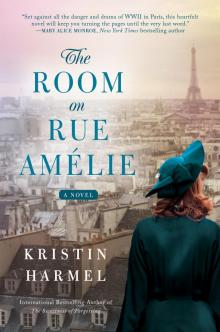 The Room on Rue Amélie
The Room on Rue Amélie The Winemaker's Wife
The Winemaker's Wife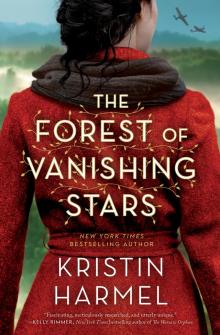 The Forest of Vanishing Stars
The Forest of Vanishing Stars The Book of Lost Names
The Book of Lost Names Italian for Beginners
Italian for Beginners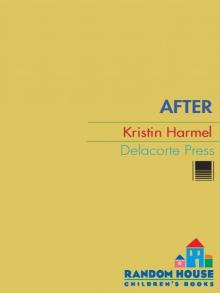 After
After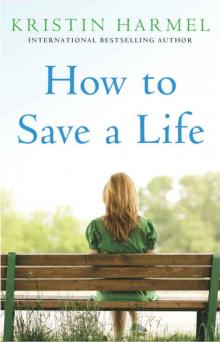 How to Save a Life
How to Save a Life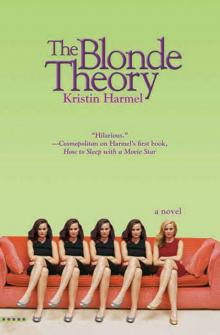 The Blonde Theory
The Blonde Theory The Sweetness of Forgetting
The Sweetness of Forgetting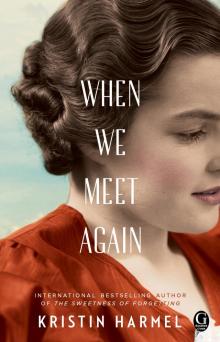 When We Meet Again
When We Meet Again Life Intended (9781476754178)
Life Intended (9781476754178)